#Master in public policy
Link
Master in public policy allows you to pursue careers involving knowledge of public policy and its effects. This program provides comprehensive training in designing public policies for complex societal problems. Public policy courses in India deal with the network of interrelated decisions that lead to the creation of new rules, laws, and regulations. Visit our official website to know more in detail.
0 notes
Text
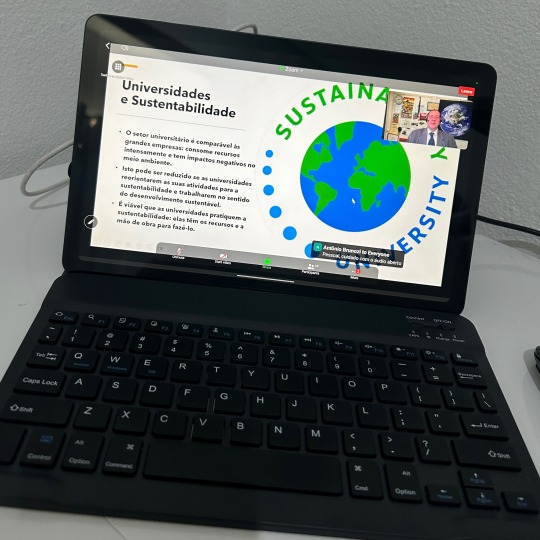


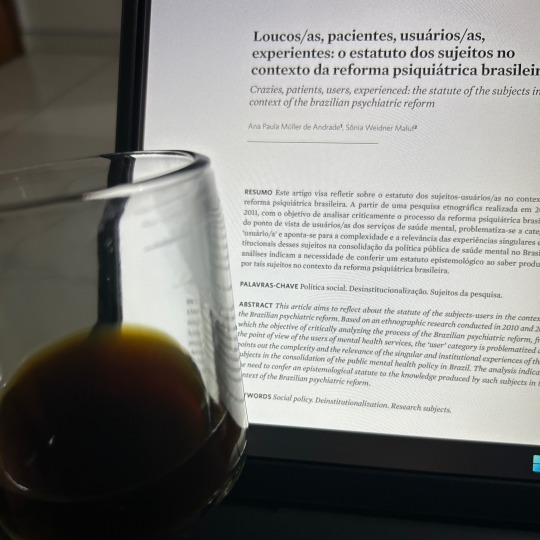


april 3rd, 2024.
today was football + reviewing + sustainability presentation day. thought it was going to rain since it was so cloudy, but the weather just got muggy instead - the worst kind of weather imo.
🎧 listening to: midas touch - kiss of life
📖 reading: my master’s research project
💭 feeling: tired and with a headache :(
#productivity log#football#mcfc#man city#manchester city#studying#studyblr#study log#post grad life#post graduate#post grad#masters#masters degree#research#public policy#mine
4 notes
·
View notes
Text
Ugh okay nobody tells you how fast college goes. I feel like I’m going through a midlife crisis right now with what I want to do as my profession. I was so set in law school to follow in my father’s footsteps (I’m a huge daddy’s girl) UNTIL last semester where my freaking prelaw professor made us read One L by Scott Turow which made me say “absolutely not” about law school. Now my mom is thinking I should get my masters in public policy… reminder: I’m only a sophomore in college (my mom said senior probs because my sister is a senior in college and got us mixed up lol). It’s just going sooooo fast and I already have to plan the next steps of my life ugh but getting my masters for public in DC would be so badass of me but SO MUCH DEBT and probably very competitive
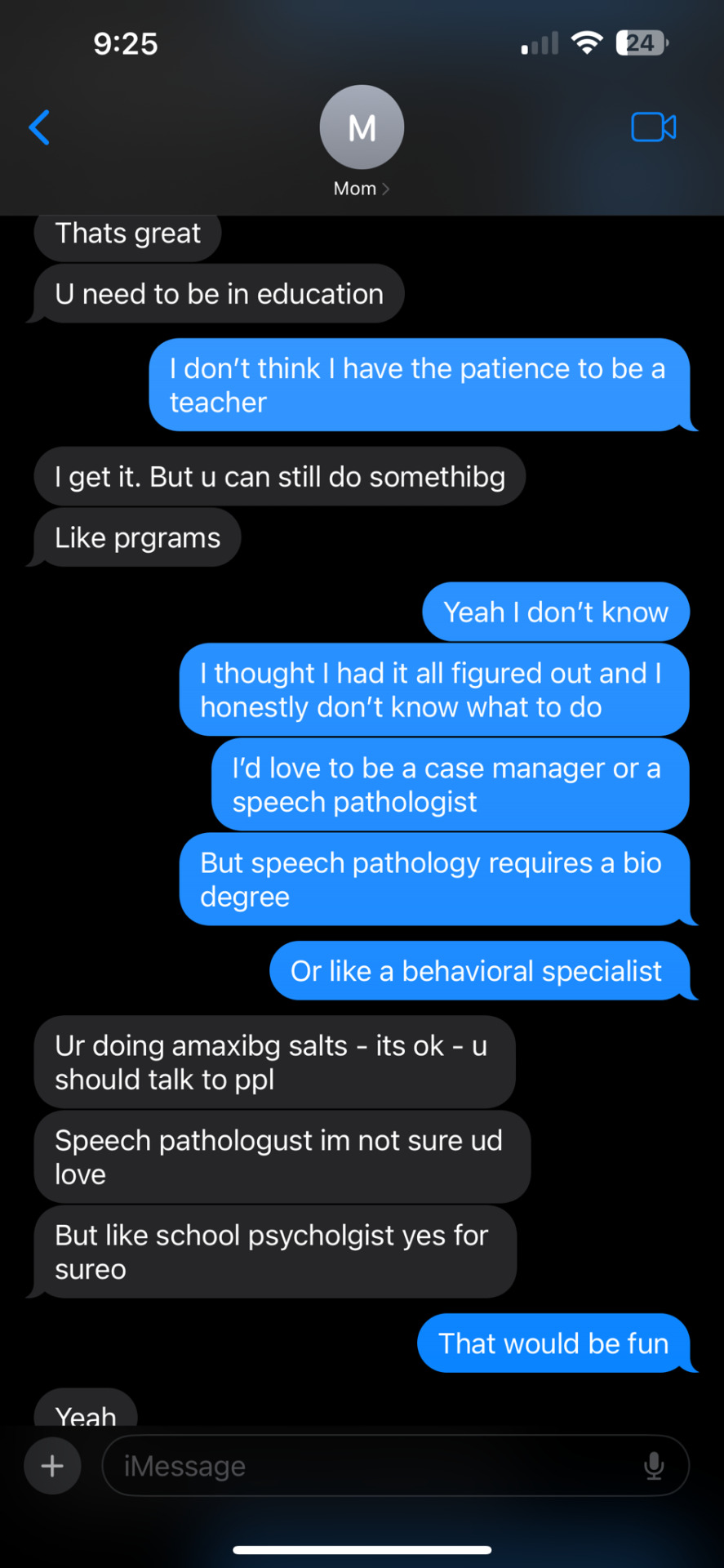

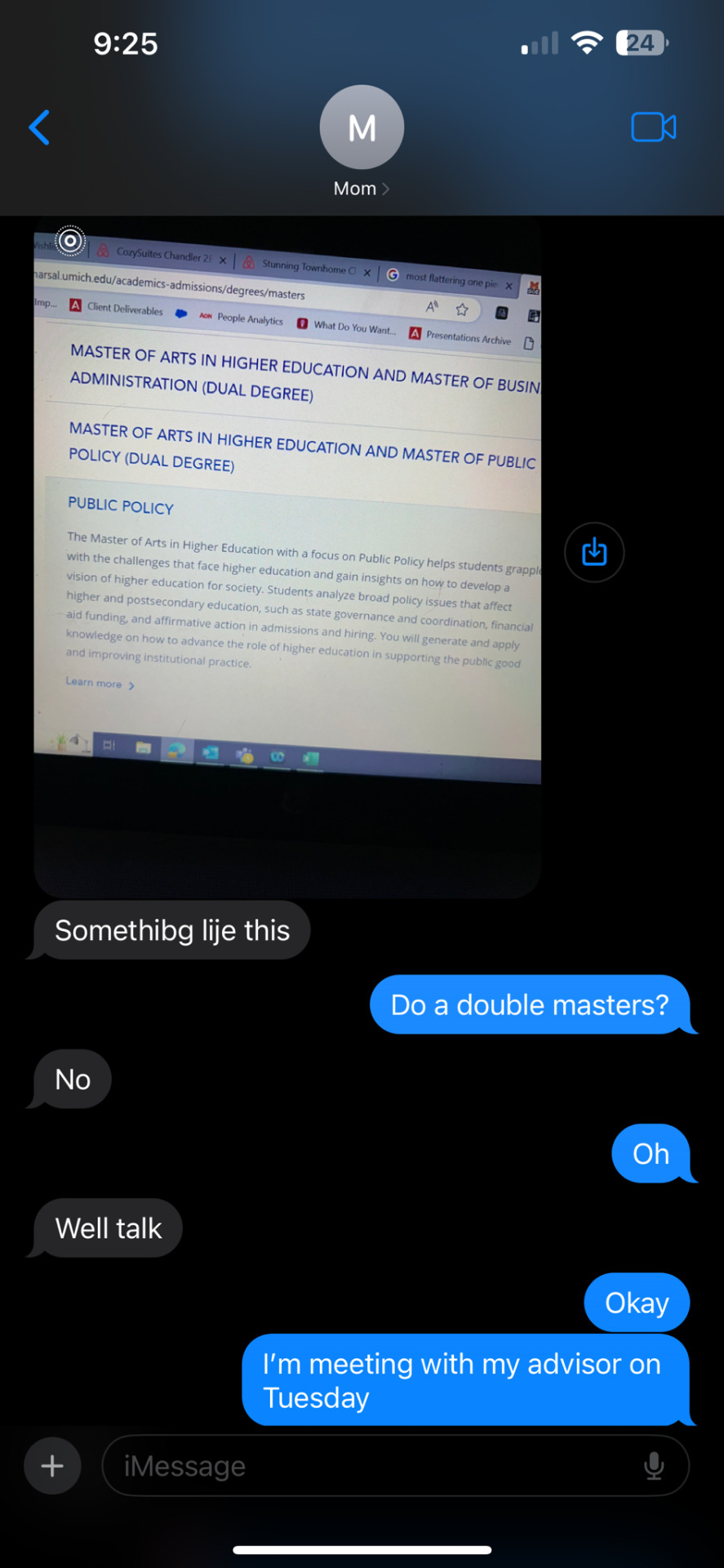

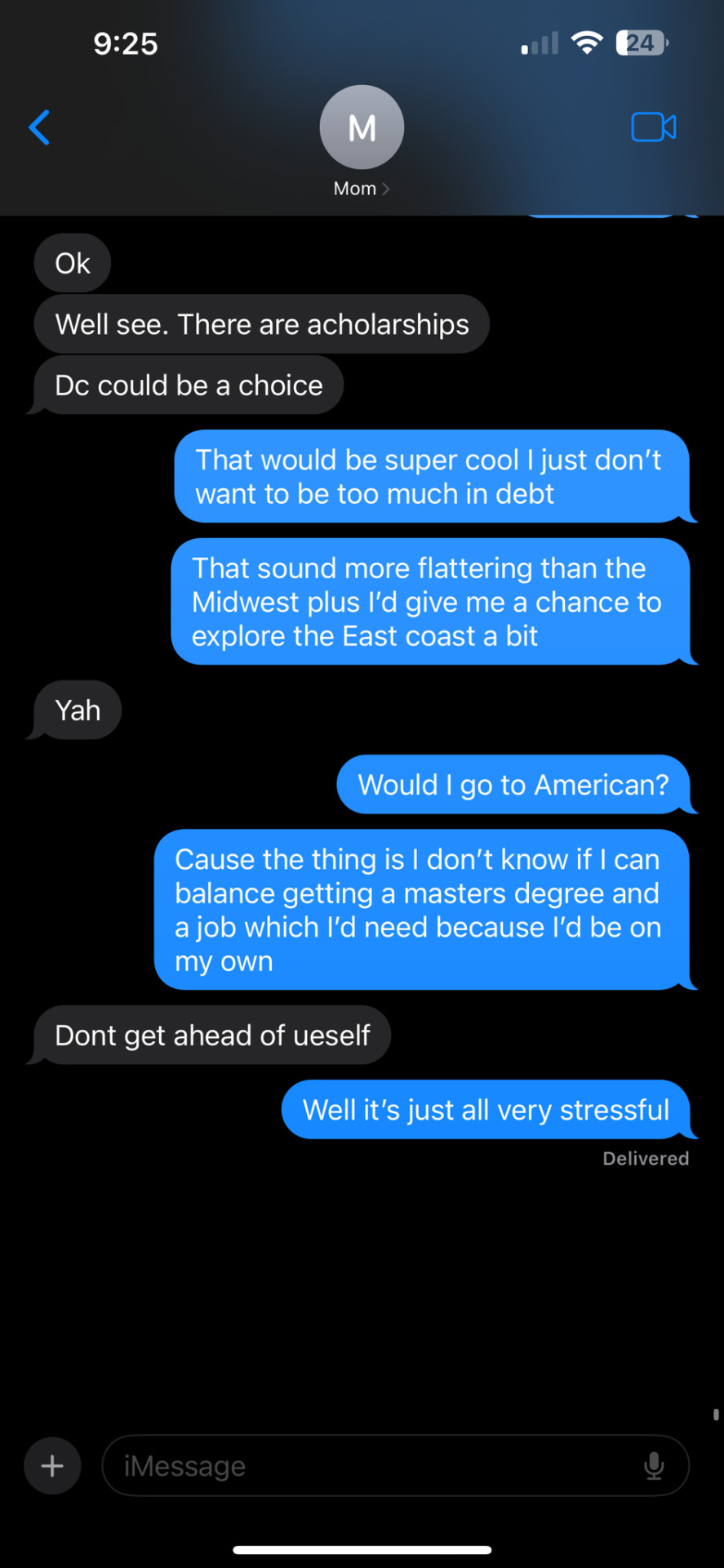
#i’m a college student#college goes by so fast#enjoy the now#masters degree#public policy#this is so stressful
2 notes
·
View notes
Text
i fear i am failing intro to macroeconomics
#tbf. i also thought this about microecon which i got an A in so i am frequently a catastrophizer#but its real this time. why did i want to go into policy why do i want a masters in public administration#(remembers how horribly run the govt is) oh yeah thats why#also my cv is horrible rn like woah . local woman has zero accomplishments worthy of graduate school admission down to her gpa#txt
2 notes
·
View notes
Note
Followed for the "putting my degree to good use" posts - friend is writing a(n amazing) novel that features energy scarcity as a main plot point and I'm very involved in the process and WE'RE MAKING IT SCIENTIFICALLY ACCURATE BOYS! Ur doing the lords work tysm
YES I LOVE IT WHEN YOU GUYS LIKE MY ENERGY STUFF!!!!! I'm glad you find my info useful, hit me up if you have any questions!
#red qanda#putting my degree to good use. on tumblr#for those who don't know i've got a master's in international energy policy with a focus on environment and sustainability#and i work at a public institution as an energy policy analyst#hence me talking about random energy policies sometimes#uhhhhhhhhh fun fact of the day: nebraska is the only US state to have all of its electric utilities be 100% public!#no private companies controlling electricity here!#makes it a bitch to track though
2 notes
·
View notes
Text
can someone anyone tell me a masters of anthropology is going to be worth it like ........
#hello? girl? hello? anyone???#even my bro who did a masters of anth and is now in a very successful and lucrative career w it was like. yeah i wouldn't have done it#if i didn't think i was going to get a phd and be a professor at the time.#like ok........so now what......#i dooon't want to be a lawyer anymore. any masters i want to do are deemed Useless. so like...........#@the world ..... what do u want me 2 do like .......#ellie yodels#plus i literally am looking online alllll the time at people who's careers i admire and no small amount of them have a background in anth!#or at least anth-adjacent!#idfkkk girl...............#like fr i could always get two masters. anth and public policy.....but thats literally what my bro and his wife did respectively so like...#i can't do it then.....(sarcastic but also not bc why does some small part of me actually feel that way fr....)......#anyway girl this just feels like such a fake problem .#no WAYYYYY someone is gonna tell me ANY masters is useless tf!!#aint no WAYYY!#..............right................................
0 notes
Text
Recounting New Horizons in Business and Public Health Education in India

In a rapidly evolving global economy, advanced degrees in specialized fields are becoming increasingly crucial for professionals looking to make a significant impact. In India, two areas of study gaining immense popularity are family business management and public health policy. This article delves into the benefits of pursuing a Master in Family Business Management, a Master of Public Health course and a Master's in Public Policy in India, with a spotlight on D.Y. Patil University (DYPU) is a leading institution offering these programs.
Preserving Legacies With Family Business Management Degree
Family owned businesses are a vital part of the global economy and India is no exception. A Master in Family Business Management equips students with the skills to navigate the complexities of family owned enterprises. This program focuses on succession planning, conflict resolution and innovative business strategies to ensure long term success.
Key Benefits
Strategic Leadership: Students learn to lead their family businesses strategically, balancing tradition with modern business practices.
Succession Planning: The course emphasizes the importance of preparing for leadership transitions to maintain business continuity.
Conflict Management: Students gain skills in managing interpersonal dynamics and resolving conflicts within family run enterprises.
This program is ideal for individuals poised to take over family businesses, entrepreneurs seeking to understand family dynamics in business and professionals interested in consulting for family owned enterprises.
Master of Public Health Course Towards Shaping Healthier Societies
With the increasing complexity of global health challenges, the Master of Public Health course in India is designed to train future health leaders. This program provides a comprehensive understanding of public health systems, epidemiology and health policy formulation.
Core Areas of Study
Epidemiology and Biostatistics: Students learn to analyze health data and apply it to improve population health outcomes.
Health Policy and Management: The course covers strategies for developing and implementing health policies at local and national levels.
Environmental and Occupational Health: Students study the impact of environmental factors on health and develop strategies to mitigate risks.
Graduates can pursue careers in government health departments, international health organizations, NGOs and research institutions, contributing to health policy and program development.
Driving Change through Masters In Public Policy
The Masters in Public Policy (MPP) in India prepares students to tackle complex policy challenges and drive impactful change. The curriculum is designed to develop analytical skills, policy formulation expertise and leadership qualities.
Program Highlights
Policy Analysis and Evaluation: Students learn to assess policy effectiveness and propose evidence based solutions.
Economic and Social Policy: The course covers a range of policy areas, including education, health and economic development.
Leadership and Ethics: Students develop leadership skills and ethical frameworks necessary for effective policymaking.
This program suits individuals aspiring to work in government, think tanks, international organizations and the private sector, influencing policy decisions and driving social change.
Why Choose DYPU?
D.Y. Patil University (DYPU) stands out as a premier institution offering these advanced degree programs. DYPU is renowned for its commitment to excellence in education and research, providing students with the knowledge and skills needed to excel in their chosen fields.
Innovative Curriculum: DYPU's programs are designed to meet the evolving needs of the global job market, emphasizing practical skills and real world applications.
Expert Faculty: Students benefit from the guidance of experienced faculty members who are leaders in their respective fields.
Global Perspective: DYPU encourages a global outlook, preparing students to work effectively in diverse and international environments.
Whether you're looking to take the reins of a family business, influence public health policies, or drive change through effective policymaking, DYPU offers programs that equip you with the tools to succeed. By choosing DYPU, students join a community of forward thinking professionals dedicated to making a difference in the world. Pursuing an advanced degree at DYPU not only enhances your career prospects but also empowers you to become a leader in your field.
#masters in sports science#masters in public policy in india#dy patil university navi mumbai#dypu navi mumbai#dypu university navi mumbai#Master of Public Health Course in India
0 notes
Text
The Pivotal Role of Public Health Education Post-Pandemic
The COVID-19 pandemic showed us the very important role of public health professionals. Especially in combating global health crises. This period of uncertainty brought to light the need for skilled individuals who are capable of enhancing healthcare systems and formulating effective health policies.
Aspiring to make a difference in public health outcomes motivates many to choose this career path.
Why Study Public Health?
This field empowers individuals to transform public health policy and healthcare delivery. Important concerns like disease prevention strategies offer a unique opportunity to contribute positively to the health and well-being of the population.
D Y Patil Deemed to be University Offers Quality Public Health Education
D Y Patil Deemed to be University is a leading institution in healthcare-focused higher education in India, particularly through its School of Public Health. The university is dedicated to resolving contemporary health issues. They do so by providing an unparalleled educational experience that balances theoretical knowledge with practical skills. Let us look at their unmatched educational experience:
State-of-the-Art Facilities
Technologically Advanced Campus:
Includes an auditorium for interactive learning and a cutting-edge computer lab for sophisticated data analysis.
Knowledge Resource and Innovation Centres
Promotes in-depth study, knowledge expansion, and entrepreneurial endeavors.
Comprehensive Medical Simulation Lab
In collaboration with Mayo Clinic USA, this facility offers immersive clinical experiences. It prepares students for healthcare complexities with practical and hands-on training.
Unmatched Learning Experience
Diverse Alumni Network
Access to internships and career opportunities connect students with industry leaders. This enhances their professional trajectory. The alumni network is widespread and highly recognised.
Partner Hospitals
The university ensures that the certified hospitals offer vital exposure to a wide range of illnesses and therapies.This is essential for refining practical medical skills.
Cutting-Edge Curriculum and Interdisciplinary Pedagogy
The curriculum at the School of Public Health is constantly updated. This is done to align with global public health trends. An interdisciplinary approach to teaching incorporates role-plays and seminars. Apart from this expert lectures accommodates students from varied academic backgrounds.
Comprehensive Public Health Programs
The School of Public Health offers courses tailored to meet the diverse needs of students:
The Bachelor of Public Health course is designed for undergraduates looking for foundational knowledge in public health principles and practices.
The Master of Public Health course provides advanced skills in public health research. They also do the same for policy analysis, health services management and more. It ranks among the best public health courses in India.
The Masters in Public Policy focuses on healthcare management and policy development. This enables students to craft effective health policies and contribute to societal well-being.
In complementing its public health education ambition, D Y Patil Deemed to be University also shines with its Master in Family Business Management program. This course highlights the university’s holistic approach to education. It recognizes the crucial role of family-owned businesses in the economy and society. It is tailored to cultivate leadership and sustainable growth strategies within the family business context.
The program aligns with the many different needs of the business world. This is especially evident in the adaptability required during crises like COVID-19. By blending business acumen with an awareness of broader societal needs the program prepares graduates to lead their family enterprises with a forward-thinking and responsible approach.
In the wake of the pandemic, the value of public health education has never been more evident. D Y Patil Deemed to be University offers a path to a career that can change lives and shape the future of public health.
#master in family business management#master of public health course in india#masters in public policy india
0 notes
Text
University of Canberra - Postgraduate Online
The University of Canberra, a premier institution in Australia’s vibrant capital, is dedicated to providing an unparalleled online educational experience. Our array of online courses, including the Juris Doctor and Master of Counselling, are crafted to empower you through a learning journey that is both independent and supported, ensuring your needs are always at the forefront.

Our Graduate Diplomas and Certificates in Counselling, Legal Studies, Public Policy, and Education, along with our Master of Social Work (Qualifying) and specialised STEM Education programs, are designed to be in sync with the latest work trends. This ensures that your education is not just contemporary but also predictive of future professional landscapes.
Being part of a network of professionals, experts, industry peak bodies, and government, we provide you with a learning experience that is rich in real-world context and opportunities. Our commitment to your success is reflected in our ranking as the #1 university in Canberra for overall experience and our position among the top two universities in Australia.
youtube
Choose the University of Canberra for your online Postgraduate studies, and join a community where education is more than just a degree—it’s a catalyst for personal and professional transformation.
#Master of Education (STEM)#University of Canberra - Postgraduate Online#Juris Doctor Online#Master of Counselling Online#Graduate Diploma in Counselling Online#Master of Public Policy Online#Master of Education Online course#online Master of Counselling#online Master of Social Work#Youtube
1 note
·
View note
Text
Business Leadership in Digital Age: IIT Kanpur ropes in Dr R S Sharma, Dr Ajay Kumar to drive e-Masters Program
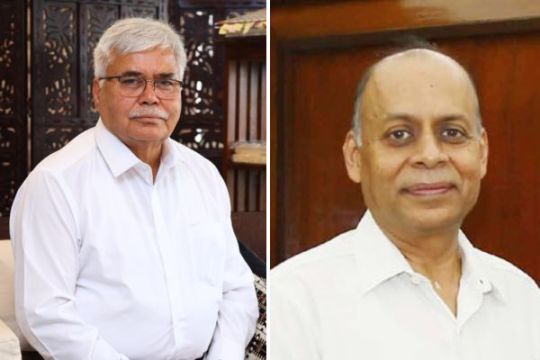
New Delhi: One is known as one of the main brains behind digital transformative programs such as Aadhaar & Cowin. And the other is known for his tech acumen to bring startup revolution in India’s defence sector. Yes, you guessed it right. We are talking about Dr R S Sharma and Dr Ajay Kumar, two former bureaucrats, who have played pivotal role in India’s digital governance journey. And IIT Kanpur ropes in both to drive its e-Masters program for Business Leadership in Digital Age, first course of such types in India.
Dr R S Sharma was the former Chairman of TRAI and the former CEO of National Health Authority, Government of India. He is a retired Indian Administrative Service (IAS) officer of 1978 batch. Dr Ajay Kumar was the former Defence Secretary of India, and he is also a retired Indian Administrative Service (IAS) officer of the 1985 batch. At the same time, both are known globally as the policymakers of repute for their transformational work to drive India’s digital transformation in last two decades. IIT Kanpur has now reached out to them to start a pioneering course which can prepare future generations to leverage technology in a digitally disrupted and constantly evolving global business landscape.
Read More - https://apacnewsnetwork.com/2023/09/business-leadership-in-digital-age-iit-kanpur-ropes-in-dr-r-sharma-dr-ajay-kumar-to-drive-e-masters-program/
#APACExclusive#Business Leadership in Digital Age#IIT Kanpur ropes in Dr R Sharma#Cyber Security#Digital Age#Digital Transformation#Dr Ajay Kumar#Dr Ajay Kumar to drive e-Masters Program#Dr RS Sharma#Economicse#Masters#Emerging Technology#Global Policy#IIT Kanpur#IIT Kanpur ropes#India#Public Policy
0 notes
Link
Are you planning to pursue a Master's degree in Public Policy and want to know what this degree is all about? Here you will learn about the multidisciplinary postgraduate Master in Public Policy course, a full-time course in Public Policy that explains several aspects of public policy and enables students to comprehensively address contemporary social, political, cultural, or economic problems.
0 notes
Text

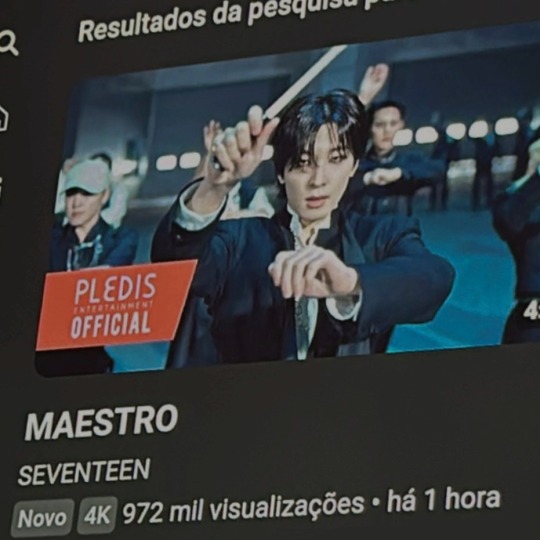
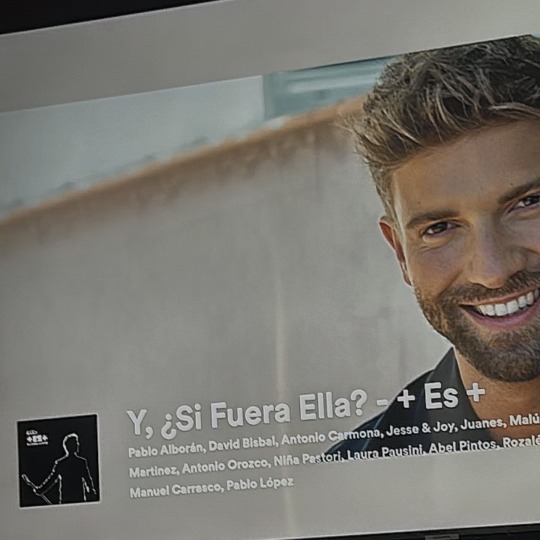

29/04/2024
for someone whose favorite colors are black and pink, i sure do own a surprising amount of blue stuff…
i got my outline for my dissertation argue done today, but i still have to reduce it a little tomorrow. also got some corrections done and drafted some questions i think the evaluators may ask me. i am definitely scared out of my wits for this event.
today was also they day seventeen’s maestro came out. not gonna lie, i adore jihoon, but this song was really underwhelming music-wise. the mv however? possibly the best one to this day! but i am a little biased, seeing as the cyber punk aesthetic is one of my favorites.
ps: we got hannigram reunion panel today too, and a madancy selfie!! hannigram is a lifestyle, and i am fully committed. the only ones more committed than me? MADANCY
🎧 listening to: error - ash island ft. loopy (the vice is back)
📖 reading: my dissertation project
💭 feeling: anxious and jittery
#studyblr#masters degree#post grad#post grad life#post graduate#productivity log#studying#chaotic academia#mine#public policy#study motivation#study blog#studyspo#studyblr community#chaotic academic aesthetic#academia#business major#research
0 notes
Text
youtube
Guest Session | Shri Sanjeev Sanyal, Member PM-EAC
In this video, we present a special message from Sanjeev Sanyal directly to public policy aspirants. Drawing from his vast experience and expertise, he shares valuable insights and guidance for those interested in pursuing a career in public policy. Sanjeev Sanyal's message provides valuable advice and perspectives that can help aspiring policy professionals navigate their career paths effectively. For more details visit www.ispp.org.in
#public policy and administration in india#courses in public policy#public policy course india#master in public policy india#implementing public policy#public policy and management#Youtube
0 notes
Text
Why Kids Aren't Falling in Love With Reading - It's Not Just Screens
A shrinking number of kids are reading widely and voraciously for fun.
The ubiquity and allure of screens surely play a large part in this—most American children have smartphones by the age of 11—as does learning loss during the pandemic. But this isn’t the whole story. A survey just before the pandemic by the National Assessment of Educational Progress showed that the percentages of 9- and 13-year-olds who said they read daily for fun had dropped by double digits since 1984. I recently spoke with educators and librarians about this trend, and they gave many explanations, but one of the most compelling—and depressing—is rooted in how our education system teaches kids to relate to books.
What I remember most about reading in childhood was falling in love with characters and stories; I adored Judy Blume’s Margaret and Beverly Cleary’s Ralph S. Mouse. In New York, where I was in public elementary school in the early ’80s, we did have state assessments that tested reading level and comprehension, but the focus was on reading as many books as possible and engaging emotionally with them as a way to develop the requisite skills. Now the focus on reading analytically seems to be squashing that organic enjoyment. Critical reading is an important skill, especially for a generation bombarded with information, much of it unreliable or deceptive. But this hyperfocus on analysis comes at a steep price: The love of books and storytelling is being lost.
This disregard for story starts as early as elementary school. Take this requirement from the third-grade English-language-arts Common Core standard, used widely across the U.S.: “Determine the meaning of words and phrases as they are used in a text, distinguishing literal from nonliteral language.” There is a fun, easy way to introduce this concept: reading Peggy Parish’s classic, Amelia Bedelia, in which the eponymous maid follows commands such as “Draw the drapes when the sun comes in” by drawing a picture of the curtains. But here’s how one educator experienced in writing Common Core–aligned curricula proposes this be taught: First, teachers introduce the concepts of nonliteral and figurative language. Then, kids read a single paragraph from Amelia Bedelia and answer written questions.
For anyone who knows children, this is the opposite of engaging: The best way to present an abstract idea to kids is by hooking them on a story. “Nonliteral language” becomes a whole lot more interesting and comprehensible, especially to an 8-year-old, when they’ve gotten to laugh at Amelia’s antics first. The process of meeting a character and following them through a series of conflicts is the fun part of reading. Jumping into a paragraph in the middle of a book is about as appealing for most kids as cleaning their room.
But as several educators explained to me, the advent of accountability laws and policies, starting with No Child Left Behind in 2001, and accompanying high-stakes assessments based on standards, be they Common Core or similar state alternatives, has put enormous pressure on instructors to teach to these tests at the expense of best practices. Jennifer LaGarde, who has more than 20 years of experience as a public-school teacher and librarian, described how one such practice—the class read-aloud—invariably resulted in kids asking her for comparable titles. But read-alouds are now imperiled by the need to make sure that kids have mastered all the standards that await them in evaluation, an even more daunting task since the start of the pandemic. “There’s a whole generation of kids who associate reading with assessment now,” LaGarde said.
By middle school, not only is there even less time for activities such as class read-alouds, but instruction also continues to center heavily on passage analysis, said LaGarde, who taught that age group. A friend recently told me that her child’s middle-school teacher had introduced To Kill a Mockingbird to the class, explaining that they would read it over a number of months—and might not have time to finish it. “How can they not get to the end of To Kill a Mockingbird?” she wondered. I’m right there with her. You can’t teach kids to love reading if you don’t even prioritize making it to a book’s end. The reward comes from the emotional payoff of the story’s climax; kids miss out on this essential feeling if they don’t reach Atticus Finch’s powerful defense of Tom Robinson in the courtroom or never get to solve the mystery of Boo Radley.
... Young people should experience the intrinsic pleasure of taking a narrative journey, making an emotional connection with a character (including ones different from themselves), and wondering what will happen next—then finding out. This is the spell that reading casts. And, like with any magician’s trick, picking a story apart and learning how it’s done before you have experienced its wonder risks destroying the magic.
-- article by katherine marsh, the atlantic (12 foot link, no paywall)
16K notes
·
View notes
Text
Why was I just at drinks with an actual Chinese un diplomat ?
#she’s doing a masters in public policy in my uni atm madness#but she’s worked as a diplomat for 10 years
0 notes
Text
Tech monopolists use their market power to invade your privacy

On SEPTEMBER 24th, I'll be speaking IN PERSON at the BOSTON PUBLIC LIBRARY!

It's easy to greet the FTC's new report on social media privacy, which concludes that tech giants have terrible privacy practices with a resounding "duh," but that would be a grave mistake.
Much to the disappointment of autocrats and would-be autocrats, administrative agencies like the FTC can't just make rules up. In order to enact policies, regulators have to do their homework: for example, they can do "market studies," which go beyond anything you'd get out of an MBA or Master of Public Policy program, thanks to the agency's legal authority to force companies to reveal their confidential business information.
Market studies are fabulous in their own right. The UK Competition and Markets Authority has a fantastic research group called the Digital Markets Unit that has published some of the most fascinating deep dives into how parts of the tech industry actually function, 400+ page bangers that pierce the Shield of Boringness that tech firms use to hide their operations. I recommend their ad-tech study:
https://www.gov.uk/cma-cases/online-platforms-and-digital-advertising-market-study
In and of themselves, good market studies are powerful things. They expose workings. They inform debate. When they're undertaken by wealthy, powerful countries, they provide enforcement roadmaps for smaller, poorer nations who are being tormented in the same way, by the same companies, that the regulator studied.
But market studies are really just curtain-raisers. After a regulator establishes the facts about a market, they can intervene. They can propose new regulations, and they can impose "conduct remedies" (punishments that restrict corporate behavior) on companies that are cheating.
Now, the stolen, corrupt, illegitimate, extremist, bullshit Supreme Court just made regulation a lot harder. In a case called Loper Bright, SCOTUS killed the longstanding principle of "Chevron deference," which basically meant that when an agency said it had built a factual case to support a regulation, courts should assume they're not lying:
https://jacobin.com/2024/07/scotus-decisions-chevron-immunity-loper
The death of Chevron Deference means that many important regulations – past, present and future – are going to get dragged in front of a judge, most likely one of those Texas MAGA mouth-breathers in the Fifth Circuit, to be neutered or killed. But even so, regulators still have options – they can still impose conduct remedies, which are unaffected by the sabotage of Chevron Deference.
Pre-Loper, post-Loper, and today, the careful, thorough investigation of the facts of how markets operate is the prelude to doing things about how those markets operate. Facts matter. They matter even if there's a change in government, because once the facts are in the public domain, other governments can use them as the basis for action.
Which is why, when the FTC uses its powers to compel disclosures from the largest tech companies in the world, and then assesses those disclosures and concludes that these companies engage in "vast surveillance," in ways that the users don't realize and that these companies "fail to adequately protect users, that matters.
What's more, the Commission concludes that "data abuses can fuel market dominance, and market dominance can, in turn, further enable data abuses and practices that harm consumers." In other words: tech monopolists spy on us in order to achieve and maintain their monopolies, and then they spy on us some more, and that hurts us.
So if you're wondering what kind of action this report is teeing up, I think we can safely say that the FTC believes that there's evidence that the unregulated, rampant practices of the commercial surveillance industry are illegal. First, because commercial surveillance harms us as "consumers." "Consumer welfare" is the one rubric for enforcement that the right-wing economists who hijacked antitrust law in the Reagan era left intact, and here we have the Commission giving us evidence that surveillance hurts us, and that it comes about as a result of monopoly, and that the more companies spy, the stronger their monopolies become.
But the Commission also tees up another kind of enforcement: Section 5, the long (long!) neglected power of the agency to punish companies for "unfair and deceptive methods of competition," a very broad power indeed:
https://pluralistic.net/2023/01/10/the-courage-to-govern/#whos-in-charge
In the study, the Commission shows – pretty convincingly! – that the commercial surveillance sector routinely tricks people who have no idea how their data is being used. Most people don't understand, for example, that the platforms use all kinds of inducements to get web publishers to embed tracking pixels, fonts, analytics beacons, etc that send user-data back to the Big Tech databases, where it's merged with data from your direct interactions with the company. Likewise, most people don't understand the shadowy data-broker industry, which sells Big Tech gigantic amounts of data harvested by your credit card company, by Bluetooth and wifi monitoring devices on streets and in stores, and by your car. Data-brokers buy this data from anyone who claims to have it, including people who are probably lying, like Nissan, who claims that it has records of the smells inside drivers' cars, as well as those drivers' sex-lives:
https://nypost.com/2023/09/06/nissan-kia-collect-data-about-drivers-sexual-activity/
Or Cox Communications, which claims that it is secretly recording and transcribing the conversations we have in range of the mics on our speakers, phones, and other IoT devices:
https://www.404media.co/heres-the-pitch-deck-for-active-listening-ad-targeting/
(If there's a kernel of truth to Cox's bullshit, my guess it's that they've convinced some of the sleazier "smart TV" companies to secretly turn on their mics, then inflated this into a marketdroid's wet-dream of "we have logged every word uttered by Americans and can use it to target ads.)
Notwithstanding the rampant fraud inside the data brokerage industry, there's no question that some of the data they offer for sale is real, that it's intimate and sensitive, and that the people it's harvested from never consented to its collection. How do you opt out of public facial recognition cameras? "Just don't have a face" isn't a realistic opt-out policy.
And if the public is being deceived about the collection of this data, they're even more in the dark about the way it's used – merged with on-platform usage data and data from apps and the web, then analyzed for the purposes of drawing "inferences" about you and your traits.
What's more, the companies have chaotic, bullshit internal processes for handling your data, which also rise to the level of "deceptive and unfair" conduct. For example, if you send these companies a deletion request for your data, they'll tell you they deleted the data, but actually, they keep it, after "de-identifying" it.
De-identification is a highly theoretical way of sanitizing data by removing the "personally identifiers" from it. In practice, most de-identified data can be quickly re-identified, and nearly all de-identified data can eventually be re-identified:
https://pluralistic.net/2024/03/08/the-fire-of-orodruin/#are-we-the-baddies
Breaches, re-identification, and weaponization are extraordinarily hard to prevent. In general, we should operate on the assumption that any data that's collected will probably leak, and any data that's retained will almost certainly leak someday. To have even a hope of preventing this, companies have to treat data with enormous care, maintaining detailed logs and conducting regular audits. But the Commission found that the biggest tech companies are extraordinarily sloppy, to the point where "they often could not even identify all the data points they collected or all of the third parties they shared that data with."
This has serious implications for consumer privacy, obviously, but there's also a big national security dimension. Given the recent panic at the prospect that the Chinese government is using Tiktok to spy on Americans, it's pretty amazing that American commercial surveillance has escaped serious Congressional scrutiny.
After all, it would be a simple matter to use the tech platforms targeting systems to identify and push ads (including ads linking to malicious sites) to Congressional staffers ("under-40s with Political Science college degrees within one mile of Congress") or, say, NORAD personnel ("Air Force enlistees within one mile of Cheyenne Mountain").
Those targeting parameters should be enough to worry Congress, but there's a whole universe of potential characteristics that can be selected, hence the Commission's conclusion that "profound threats to users can occur when targeting occurs based on sensitive categories."
The FTC's findings about the dangers of all this data are timely, given the current wrangle over another antitrust case. In August, a federal court found that Google is a monopolist in search, and that the company used its data lakes to secure and maintain its monopoly.
This kicked off widespread demands for the court to order Google to share its data with competitors in order to erase that competitive advantage. Holy moly is this a bad idea – as the FTC study shows, the data that Google stole from us all is incredibly toxic. Arguing that we can fix the Google problem by sharing that data far and wide is like proposing that we can "solve" the fact that only some countries have nuclear warheads by "democratizing" access to planet-busting bombs:
https://pluralistic.net/2024/08/07/revealed-preferences/#extinguish-v-improve
To address the competitive advantage Google achieved by engaging in the reckless, harmful conduct detailed in this FTC report, we should delete all that data. Sure, that may seem inconceivable, but come on, surely the right amount of toxic, nonconsensually harvested data on the public that should be retained by corporations is zero:
https://pluralistic.net/2024/09/19/just-stop-putting-that-up-your-ass/#harm-reduction
Some people argue that we don't need to share out the data that Google never should have been allowed to collect – it's enough to share out the "inferences" that Google drew from that data, and from other data its other tentacles (Youtube, Android, etc) shoved into its gaping maw, as well as the oceans of data-broker slurry it stirred into the mix.
But as the report finds, the most unethical, least consensual data was "personal information that these systems infer, that was purchased from third parties, or that was derived from users’ and non-users’ activities off of the platform." We gotta delete that, too. Especially that.
A major focus of the report is the way that the platforms handled children's data. Platforms have special obligations when it comes to kids' data, because while Congress has failed to act on consumer privacy, they did bestir themselves to enact a children's privacy law. In 2000, Congress passed the Children's Online Privacy Protection Act (COPPA), which puts strict limits on the collection, retention and processing of data on kids under 13.
Now, there are two ways to think about COPPA. One view is, "if you're not certain that everyone in your data-set is over 13, you shouldn't be collecting or processing their data at all." Another is, "In order to ensure that everyone whose data you're collecting and processing is over 13, you should collect a gigantic amount of data on all of them, including the under-13s, in order to be sure that not collecting under-13s' data." That second approach would be ironically self-defeating, obviously, though it's one that's gaining traction around the world and in state legislatures, as "age verification" laws find legislative support.
The platforms, meanwhile, found a third, even stupider approach: rather than collecting nothing because they can't verify ages, or collecting everything to verify ages, they collect everything, but make you click a box that says, "I'm over 13":
https://pluralistic.net/2023/04/09/how-to-make-a-child-safe-tiktok/
It will not surprise you to learn that many children under 13 have figured out that they can click the "I'm over 13" box and go on their merry way. It won't surprise you, but apparently, it will surprise the hell out of the platforms, who claimed that they had zero underage users on the basis that everyone has to click the "I'm over 13" box to get an account on the service.
By failing to pass comprehensive privacy legislation for 36 years (and counting), Congress delegated privacy protection to self-regulation by the companies themselves. They've been marking their own homework, and now, thanks to the FTC's power to compel disclosures, we can say for certain that the platforms cheat.
No surprise that the FTC's top recommendation is for Congress to pass a new privacy law. But they've got other, eminently sensible recommendations, like requiring the companies to do a better job of protecting their users' data: collect less, store less, delete it after use, stop combining data from their various lines of business, and stop sharing data with third parties.
Remember, the FTC has broad powers to order "conduct remedies" like this, and these are largely unaffected by the Supreme Court's "Chevron deference" decision in Loper-Bright.
The FTC says that privacy policies should be "clear, simple, and easily understood," and says that ad-targeting should be severely restricted. They want clearer consent for data inferences (including AI), and that companies should monitor their own processes with regular, stringent audits.
They also have recommendations for competition regulators – remember, the Biden administration has a "whole of government" antitrust approach that asks every agency to use its power to break up corporate concentration:
https://www.eff.org/deeplinks/2021/08/party-its-1979-og-antitrust-back-baby
They say that competition enforcers factor in the privacy implications of proposed mergers, and think about how promoting privacy could also promote competition (in other words, if Google's stolen data helped it secure a monopoly, then making them delete that data will weaken their market power).
I understand the reflex to greet a report like this with cheap cynicism, but that's a mistake. There's a difference between "everybody knows" that tech is screwing us on privacy, and "a federal agency has concluded" that this is true. These market studies make a difference – if you doubt it, consider for a moment that Cigna is suing the FTC for releasing a landmark market study showing how its Express Scripts division has used its monopoly power to jack up the price of prescription drugs:
https://www.fiercehealthcare.com/payers/express-scripts-files-suit-against-ftc-demands-retraction-report-pbm-industry
Big business is shit-scared of this kind of research by federal agencies – if they think this threatens their power, why shouldn't we take them at their word?
This report is a milestone, and – as with the UK Competition and Markets Authority reports – it's a banger. Even after Loper-Bright, this report can form the factual foundation for muscular conduct remedies that will limit what the largest tech companies can do.
But without privacy law, the data brokerages that feed the tech giants will be largely unaffected. True, the Consumer Finance Protection Bureau is doing some good work at the margins here:
https://pluralistic.net/2023/08/16/the-second-best-time-is-now/#the-point-of-a-system-is-what-it-does
But we need to do more than curb the worst excesses of the largest data-brokers. We need to kill this sector, and to do that, Congress has to act:
https://pluralistic.net/2023/12/06/privacy-first/#but-not-just-privacy

The paperback edition of The Lost Cause, my nationally bestselling, hopeful solarpunk novel is out this month!

If you'd like an essay-formatted version of this post to read or share, here's a link to it on pluralistic.net, my surveillance-free, ad-free, tracker-free blog:
https://pluralistic.net/2024/09/20/water-also-wet/#marking-their-own-homework

Image:
Cryteria (modified)
https://commons.wikimedia.org/wiki/File:HAL9000.svg
CC BY 3.0
https://creativecommons.org/licenses/by/3.0/deed.en
#pluralistic#coppa#privacy first#ftc#section 5 of the ftc act#privacy#consumer privacy#big tech#antitrust#monopolies#data brokers#radium suppositories#commercial surveillance#surveillance#google#a look behind the screens
214 notes
·
View notes